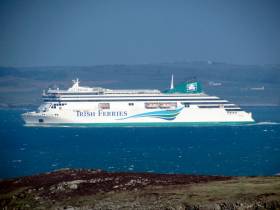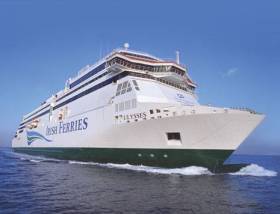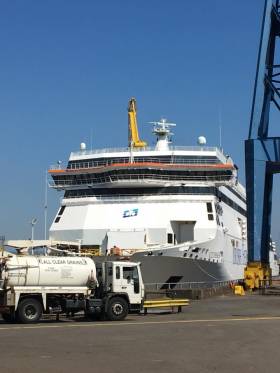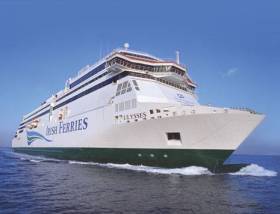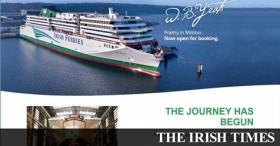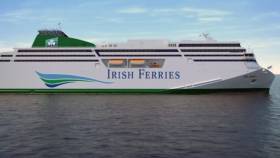Displaying items by tag: Irish Ferries
Busy Times As Almost All Irish Ferries Fleet Descend On Dublin Port
#FerryNews - On the October Bank Holiday Monday, almost all Irish Ferries ships docked in Dublin Port from where one of the ferries earlier in the month had also been kept busy in between changing routes, writes Jehan Ashmore.
The presence of four of five of the fleet, albeit not all together at the same time, was still a unique occasion in the capital's port. Each ferry took up berths throughout the course of the day, though not the Dublin Swift, which in early October had completed its first summer season serving Holyhead. During its debut in late April, the catamaran encountered a brief technical clitch when observed briefly coming to a halt off the Dublin Bay Bouy, however the maiden crossing to Holyhead was successfully completed.
Again, further technical issues led to cancelled sailings just days before the fast-craft stood down as scheduled last month. The Dublin Swift has since been in winter layover in the capital but in late October relocated to berth in Belfast, Afloat will have more to report. The craft is the only Ireland-UK cross channel fastferry and is to resume service in April 2019.
As for the Bank Holiday Monday's four-ferry line up, flagship, Ulysses was the first to arrive into the capital during dusk, having completed a routine crossing from Holyhead. Several hours later, the north Wales route fleetmate, Epsilon, a chartered-in ropax followed suit to dock at Dublin Ferryport Terminal 1. The more freight orientated ferry, with limited passenger facilities provides a 'Economy' no frills service at weekends on the year-round Dublin-Cherbourg link. In addition to those served by cruiseferry (see below: Oscar Wilde) where the schedule is until 16th December 2018.
It is from Dublin Port's main Terminal, Afloat reported last week, Ulysses encountered technical issues too. This led to a short out-of-service break to enable work be carried out within the port before resuming service as scheduled on the first day of November. Yesterday's afternoon sailing from Holyhead, however was cancelled due to a MES (marine evacuation system) deployment which took place in Dublin Port.
Returning to the Bank Holiday and at around noon the third Irish Ferries ship to Dublin Port was unusually Oscar Wilde, given the time of year. As otherwise, the Rosslare based French routes cruiseferry, would based from previous years continue connecting Cherbourg up to mid December. The second Rosslare service to Roscoff which is seasonal has ceased for this year.
Instead, Oscar Wilde throughout last month operated additional sailings on the north Wales route, partnering Ulysses and Epsilon as a three ship-service. The overnight cruiseferry, however managed to maintain direct links to France, but from Dublin Port (see more below).
The fourth and final ferry representative of the Irish Ferries fleet, Isle of Inishmore made a leisurely late morning arrival on the Bank Holiday Monday to Dublin Port, having sailed off the Leinster coast from routine south Wales route duties. The timing of the cruiseferry onto the Dublin-Holyhead route seems to be planned in advance, as Isle of Inishmore took over that same day the night sailing rostered to Ulysses which had technical reasons as mentioned above.
Isle of Inishmore however only spent a few days last week on the Holyhead route but during that time, Oscar Wilde returned to Rosslare to stand in on the Pembroke service. In addition the cruiseferry made a brief reprieve of the Rosslare-Cherbourg route by operating a round trip last week, but again at the expense, this time of a scheduled sailing directly from Dublin. This forced customers to drive to Wexford where it is understood that that sailing was delayed to another day.
In recent days, Oscar Wilde it must be noted, has reappeared in Dublin Port and operating this time only to France, to Cherbourg on Tuesdays and Thursdays. This leaves Epsilon serving at weekends a round trip from Dublin (Saturday's) to Normandy in between weekday sailings to Wales.
As Afloat previously reported the much delayed delivery of the €144m newbuild W.B. Yeats from German shipyard, FSG, which was to have made a debut in early summer, then July on the Dublin-Cherbourg route, finally began sea trials last week in the Baltic Sea.
The giant cruiseferry of 54,975 gross tonnage was also to have transferred to Dublin-Holyhead in September, thus releasing Epsilon to concentrate on the Dublin-Cherbourg over the winter months.
Following the completion of builders sea trails off the Danish Island of Bornholm, will W.B. Yeats finally make a debut on the Dublin-Holyhead route in time for next month's busy festive season? In previous years, either Rosslare based ferries, Isle of Inishmore and Oscar Wilde have boosted additional capacity on the core Ireland-Wales route to cope with demand.
To keep abreast of sailing updates across the ferry network, click here and ferry repositioning of routes.
Profits at ICG, Owners of Irish Ferries Almost Halve
#FerryNews - Profits in Irish Continental Group (ICG) almost halved to €29.7 million in the six months ended June 30, the latest figures show.
As The Irish Times reports, ICG whose ferry division Irish Ferries, saw revenue grew slightly to €157.2 million from €156.1 million in the first half of the year.
Profit before tax fell 46 per cent to €29.7 million from €47.5 million during the same period last year.
Earnings per share fell 33 per cent to 15.3 cent in the six months ended June 30 from 22.8 cent in the first half of 2017.
Total equity rose 55 per cent in the period to €240.3 million from €191.3 on June 30 last year.
For more on the financial results, click here.
Urgent Meeting Called By Unions With Irish Ferries to Discuss Pay Plans for W.B. Yeats
#FerryNews - Irish and British unions have called for an urgent meeting with Irish Ferries to discuss pay plans for a new 'super-ferry' due this autumn.
SIPTU, RMT and Nautilus reports the Irish Examiner are seeking assurances over conditions for the crew of the W.B. Yeats, which is expected to join the Dublin-Holyhead route in September.
SIPTU's Jerry Brennan says they want to ensure that new terms and conditions will not undercut existing arrangements on the Irish Sea.
To read a comment by the SIPTU representative, click here.
Ulysses Returns To Irish Sea Service After Extended Repairs
#FerryNews - Ulysses has returned to service today (Thursday 26 July), having completed a sailing from Dublin Port to Holyhead this morning.
The Irish Ferries flagship left Belfast Dry Dock yesterday evening (Wednesday 25 July) after a month of extended repairs on a problem propeller shaft.
Epsilon, the ferry drafted to replace Ulysses on the current summer schedule, is expected to remain on standby should any further technical issues be encountered.
Afloat.ie's own Jehan Ashmore will be sailing on Ulysses later today.
#FerryNews - Hundreds of holidaymakers who were forced to rearrange their travel plans after Irish Ferries cancelled all sailings of the WB Yeats to France this summer have now been told that their rescheduled crossings have also been cancelled.
As The Irish Times reports, the ferry company has transferred around 80 bookings with the ill-fated WB Yeats onto Epsilon but its scheduled crossing from Ireland to France this weekend has now been cancelled so it can ferry passengers on the Dublin-Holyhead route.
Irish Continental Group, which owns Irish Ferries, confirmed on Monday that repairs on its Ulysses vessel were more serious than originally anticipated and it will be out of service for up to two weeks.
For more on the ferry disruption during the peak-holiday season, click here.
#FerryNews - Technical issues for Irish Ferries Ulysses remain unresolved as they are more serious than originally anticipated, forcing the operator to cancel further sailings than expected during the peak season on the busy Dublin-Holyhead route.
Ulysses since late last month has been out of service due to problems with a propeller shaft that led to the largest ferry on the Irish Sea to receive repairs in Harland & Wolff, Belfast. The ferry was due to return to service last Wednesday, 4th July.
According to a statement issued today by Irish Continental Group (parent company of Irish Ferries), the cruiseferry reported technical issues of the starboard controllable pitch propeller on the (Sunday) 24th June. The investigation and repairs to the vessel were expected to take no longer than 5 days allowing the cruiseferry to resume service on the (Wednesday) 4th July. Service engineers have informed the operator, that the issue is more serious and the cruiseferry will be out of service for a further period of 1 to 2 weeks.
Irish Ferries added that despite their best efforts they were unable to find replacement tonnage in what is now the peak tourism season.
This is the first major technical problem to beset the Ulysses since introduction of the 50,938 gross tonnage cruiseferry in 2001. The vessel remains docked in Belfast Dry-Dock from where it entered on the 28th June. Afloat had previously tracked the cruiseferry make an overnight passage from Dublin Port on 26th June to Belfast Lough from where anchorage took place off Bangor before the dry dock could accommodate the 209m cruiseferry.
Irish Ferries said it would be contacting affected passengers and has adjusted the schedules of other vessels to minimise the disruption to customers as much as possible.
The operator said it will continue to run the schedule (Ex: Dublin – 08:05 & 20:55 and Ex: Holyhead – 02:40 & 14:10) using their alternate vessel Epsilon and will increase the number of Dublin Swift sailings with an additional round trip in the evening.
The disruption follows last month's announcement from ICG of another delay to newbuild delivery of cruiseferry W.B. Yeats. The cruiseferry which is similar in appearance to Ulysses but larger at around 55,000 tonnes is now set to enter service this autumn on the Dublin-Holyhead.
Originally, W.B. Yeats was to debut on the continental connection linking the capital and Cherbourg, France followed by a launch on the service to Wales in September.
#FerryNews - Operator Irish Ferries has said all sailings on the Ulysses vessel which serves the Dublin to Holyhead route have been cancelled for the next week.
As the The Irish Times reports, the ferry operator said the ship has been taken out of service due to a “technical issue” and to allow repairs be completed.
A spokeswoman for Irish Ferries said there is a problem with a propeller shaft necessitating the ship going to dry dock for a number of days and it is expected the Ulysses will return to normal service by the middle of next week.
In a statement (for updates click here) the company said all passengers affected are currently being advised and will be accommodated on an alternative ship or sailing.
For more on this story, click here.
Afloat adds the flagship departed Dublin Port this evening and is bound for Harland & Wolff, Belfast to undergo repairs.
Ferry Operator ‘Irish Ferries Understands it has Been Frustrating’ – the Understatement of the Week
#FerryNews -Irish Ferries last September announced that work had started in a German shipyard on a €144 million ship that would be the pride of its fleet. It said that, in accordance with tradition, a specially commissioned ceremonial coin would be placed in the keel during construction to “bring good luck and calm seas for the vessel”.
As The Irish Times writes, the coin has not done its job.
The “WB Yeats”– as the new boat was named following a public competition that attracted tens of thousands of submissions – has been dogged by bad luck, and its failure to arrive in Ireland on schedule ahead of a busy season of summer crossings has done untold damage to the reputation of Irish Ferries and left the holiday plans of tens of thousands of Irish passengers all at sea.
News that things were going awry with the luxury ferry – which has space for 1,885 passengers and crew, 440 cabins including suites with private balconies, and 3km of car deck space – first reached The Irish Times on April 20th. “There are rumours that Irish Ferries new €144m ship, which is scheduled to take passengers from Dublin to Cherbourg from July, is delayed by a few weeks,” a mail from a reader and would-be passenger started.
“The rumour is they are going to take the existing bookings and tell everyone they are going to be accommodated on the boat from Rosslare instead,” it continued.
To read more on the story click here.
#FerryNews - The National Transport Authority (NTA) which regulates sea travel to and from Ireland has said it is examining whether thousands of passengers impacted by Irish Ferries cancelling its summer sailings on the WB Yeats are entitled to compensation.
As The Irish Times writes, the NTA said it was “extremely disappointed” by the cancellations which will see all crossings from July 30th to September 17th scrapped .
All told approximately 19,000 passengers in addition to 10,000 passengers already affected by a previous wave of cancellations in April have had holiday planes thrown into disarray.
An NTA spokesman said those affected were entitled to full refund or an alternative sailing “at the earliest opportunity, under comparable conditions and at no additional cost”.
He said they may also “be entitled to claim compensation depending on length of delay in arrival at [THE]final destination and depending on the cause of that delay”.
The NTA is the national enforcement body for maritime passenger rights under EU Regulations and the spokesman told The Irish Times that it was “considering in light of this development how [EU RULES ]will apply to ensure that passengers impacted by this announcement receive the protections provided for”.
Passengers have expressed anger at frustration at the difficulties they have encountered in trying to make contact with the company since the cancellations were announced.
To read more on a flood of calls from customers, click here.
€7m Bill Faces Irish Ferries for Cancelling French Services
#FerryNews - A bill of up to €7 million faces Irish Ferries for cancelling scheduled French services following delays by a German shipbuilder in finishing a new craft for the company.
The ferry operator writes The Irish Times, was forced to cancel sailings of its new ship, the WB Yeats, from Dublin to France, beginning on July 30th, because its builder, Flensburger Schiffbau-Gesellschaft (FSG), had told the Irish firm that the craft would not be ready on time.
Industry analysts at stockbrokers Goodbody and Investec calculated that the cancellations, along with the resulting compensation and rebooking of passengers on alternative services, could cost €4.5 million.
Eamon Rothwell, chief executive of the ferry company’s parent, Irish Continental Group, recently estimated that earlier cancellations, also resulting from FSG’s failure to finish the WB Yeats on schedule, would cost €2.5 million.
As a result, the delay in finishing the WB Yeats leaves the shipping group facing extra costs of €7 million at its busiest time of year.
To read more on this story, click here.
As previously covered on Afloat the newbuild cruiseferry had originally been scheduled to launch sailings earlier on July 12th, click related report here.


























